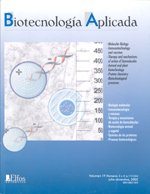
|
Biotecnologia Aplicada
Elfos Scientiae
ISSN: 0684-4551
Vol. 15, No. 2, 1998, pp. 77-82
|
 Bioline Code: ba98011
Bioline Code: ba98011
Full paper language: Spanish
Document type: Research Article
Document available free of charge
|
|
|
Biotecnologia Aplicada, Vol. 15, No. 2, 1998, pp. 77-82
| es |
Producción de vitroplántulas de tomate ( Lycopersicon esculentum  Mill) y determinación de la producción de fruto Mill) y determinación de la producción de fruto
Enríquez del Valle, José Raymundo; Carrillo-Castañeda, Guillermo & Mendoza, Juan Velázquez
Resumen
Para la generación dinámica de cultivos transgénicos se requiere de tecnología apropiada para la óptima regeneración de brotes y regeneración de vitroplantas de calidad, características determinadas por el genotipo y afectadas por el ambiente. 1. El 98 % de los explantes obtenidos de plantas de tomate de la variedad Contessa formaron callo, pero el desarrollo de brotes: a) fue de 59,97 %, y se regeneraron 2,44 brotes promedio por explante al colocar la superficie del envés sobre el medio de cultivo; con ello se obtuvo prácticamente la mitad al colocarlos con la cara del haz en contacto con el medio; b) fue modificado por la edad y período del año en que fueron desarrolladas las plantas donadoras del tejido puesto que 95,7; 90,2 y 49,6 % de los explantes formaron brotes al utilizar plantas de 4, 6 y 8 semanas de edad; en este mismo orden, de 4,27; 4,32 y 2,61, se dio el número promedio de brotes por explante obtenidos; c) fue de 98 % generándose 3,27 brotes promedio por explante, cuando éstos fueron obtenidos de tejido foliar de vitroplántulas. 2. Las plantas micropropagadas no presentaron casos de albinismo o malformaciones y la producción y calidad de fruto de éstas fue similar al de las plantas de semilla.
Palabras-clave
inducción de brotes, micropropagación, rendimiento
|
| |
| en |
Enríquez del Valle, José Raymundo; Carrillo-Castañeda, Guillermo & Mendoza, Juan Velázquez
Abstract
Appropriate technology to enhance shoot induction ability and vitroplants quality, characteristics determined by the genotype but strongly affected by the environment, might facilitate the generation of transgenic crops. 1. In the tomato variety Contessa 98 % of the leaf explants formed callus but shoot induction: a) was observed in 59.97 % of the explants being 2.4 the mean number of shoots per explant if the back side of the leaf disks were placed in contact with the medium. Half as much was the percentage obtained putting the other side of the explants in contact with the medium; b) was modified by age and period of the year in which the leaf tissue of the donor plant were developed since 95.7, 90.2 and 49.6 % of the explants obtained from 4, 6 and 8 weeks old plants respectively developed shoots being, in the same order, 4.27, 4.32 and 2.61 the mean number of shoots obtained per explant; c) was detected in 98 % of vitroplantlet leaf tissue explants and 3.27 mean shoots per explant were obtained. 2. Similar performance of the plants obtained from seed and from leaf tissue was observed, in particular fruit quality and yields, when all of them were cultured under soil conditions.
Keywords
shoot induction, micropropagation, yield
|
| |
© Copyright 1998 Elfos Scientiae
Alternative site location: http://elfosscientiae.cigb.edu.cu/Archivo.asp?Id=6
|
|
